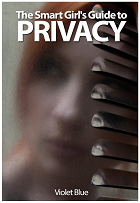In case you’re not aware, dear Reader, today is World Book Day.
It’s an annual celebration of books and a reminder to everyone about the importance of reading and literacy.

On a related note, I have put together a brief overview and review of a book about privacy entitled “The Smart Girl’s Guide To Privacy“.
Penned by Violet Blue, an investigative journalist who has bylined for CNET, ZDNet and other online news sites that cover security, cybercrime and tech, this nifty guide is her latest publication and hardly a month old.
Although it was written with the ladies in mind, anyone who uses the Internet and is concerned about their online privacy can benefit from Miss Blue’s wisdom and experiences.
She revealed in the book that she was a victim of online stalking, bullying and reputation smearing once, but in the end of her battle, she came out empowered and more in-control of her online information and presence.
Part of the book’s introduction is a short test for the ladies to check the state of their privacy online. It involves simple name and image searches on Google and “people search” sites. This gives the reader an idea of how much personal information and images are readily available about them on the public Web. This little activity may scare and shock some, to which Ms. Blue encourages readers not to panic.
“What’s online doesn’t have to stay visible forever,” she adds.
“As women, we’re targeted just by showing up,” Ms. Blue writes. “Many young women aren’t even aware that they bear target status. […] Some people might also try to tell you that by being online, sharing photos, or having a public presence on the Internet, you’re somehow ‘asking for it’. Don’t fall for it.”
The chapters following this contain in-depth breakdowns of steps to take in order to:
- secure ones emails and identify which services to trust
- manage passwords the smart way
- silo personally identifiable information (PII)
- recover from identity theft and hacking, and
- take down or make offensive content “disappear” from most of the public’s eye
This book also contains an invaluable compilation of PIIs that people share online, with each tagged RED, YELLOW or GREEN depending on the criticality of how it can directly harm you if placed in the wrong hands.
Information marked as RED, such as real full name and Social Security Number for example, are never to be made public; the YELLOW ones, say primary screen name and contact number, should be shared only to a degree and on certain websites you trust; those tagged GREEN, such as general likes and hobbies, are safe to share publicly.
She also listed down grave mental, emotional and social effects of losing one’s privacy by not limiting the sharing of personal information, experiences and photos.
With all the services available online that claim to take care of or protect your privacy, Violet Blue maintains that the bulk of the job of taking care of one’s information—what should and shouldn’t be shared whenever, wherever, and to whomever—is still the user’s. It’s a big responsibility that requires smart handling.
If you’re up to starting or finishing a book today, you may want to add-in in the last-minute “The Smart Girl’s Guide To Privacy” to your reading list.
Quick readers will be able to breeze through all 133 pages in no time; however, I suggest you consider reading this gem thoughtfully. It’s packed with practical, no-nonsense advice on how to secure what you own (your information) online; fight back against stalkers, creepers, and bullies; and—at the end of fight—regain control of your online life, which for some is the only life they know.
For real-time updates on what’s happening this World Book Day all over the globe, tune in to the following Twitter hash tags: #WorldBookNight, #WorldBookDay, and #WorldBookAndCopyrightDay.
Happy reading!
Jovi Umawing










